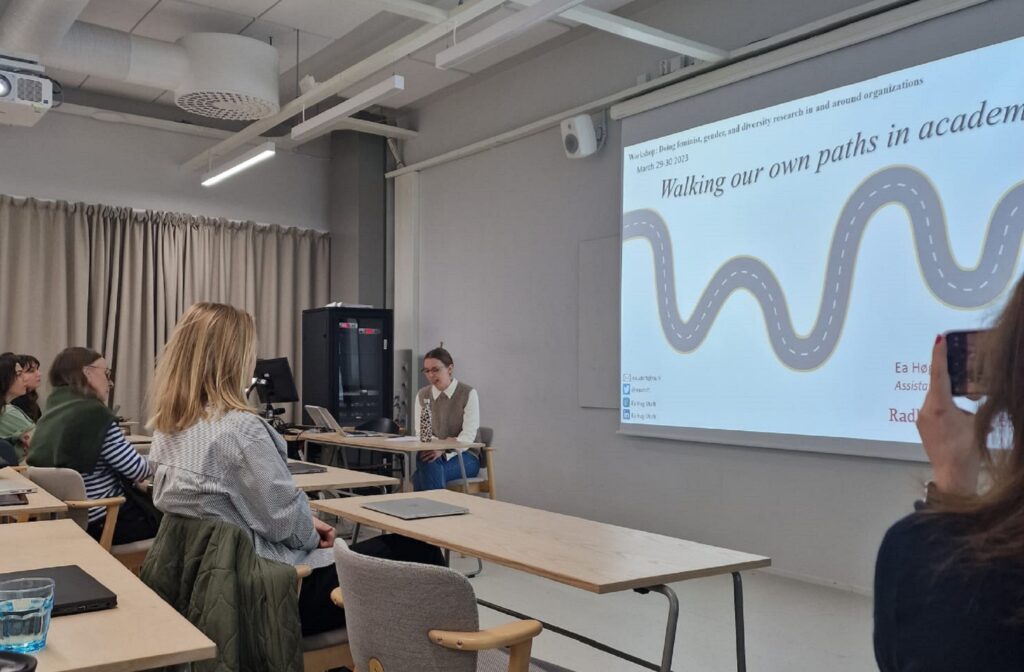Photo by Rasika Mahajan
We, that is Tatjana Graf and Rasika Mahajan, attended a workshop on “Doing feminist, gender, and diversity research in and around organizations” organised by Aalto University in Helsinki in March 2023. As we found ourselves discussing and exchanging inspiring content also after arriving back in our home university, we want to share our reflections in this blog post.
The workshop was organised by Dr. Paula Koskinen Sandberg and Laura Kangas-Müller both working on organisation, management, and feminist-related topics at Aalto University. Along with the formal workshop sessions, the informal lunches and social events fuelled by traditional Finnish delicacies offered networking opportunities for the 25 participants.
Each participant prepared a short presentation on their current work. The workshops included relevant feminist topics in the organisational context, such as effects and bodies, political encounters, feminist solidarity, “othering”, the sensation of (un)belonging and gender dichotomy, gatekeeping, and inequalities. From the participants’ presentations and networking, gender (in)equality in gaming, caretaking, as well as personal experiences, gender stereotyping, and binary perspectives, writing or self-positioning, femtech, IP laws related to feminist equality were also introduced.
“The caring coven” by Ea Høg Utoft
The keynote speech given by Ea Høg Utoft was based on two of her papers, “The caring coven: Sensing in- and out-of-placeness in masculinist, neoliberal academia”, written together with Marianne Kongerslev and “Without him, I probably wouldn’t be here at all – The micro-politics of early-career sponsorship in higher education” written in collaboration with Mathilde Cecchini. In her presentation, Ea highlighted the relation between senior scholars and early career researchers (ECR) based on the research question of how seniors’ sponsorship and gatekeeping practices shape ECRs’ perceptions of their job security or precariousness. Additionally, she introduced five autoethnographic vignettes of her own, but also gave room to voices of fellow colleagues about their own experiences of gender-specific issues in everyday-academic life. Highlighting humor as a form of resistance Ea included the figure of a “witch” as an agent of collectivity and (sarcastic) rebellion and the concept of “the caring coven” as a place of support and community, as well as movement against oppressive exclusionary institutions.
Tatjana’s reflection
Ea Høg Utoft & Mathilde Cecchini’s approach to consider seniors as gatekeepers and “brokers” of the access has provided me with many helpful insights to analyse the correlation between networking and gender (in)equality within a male-dominated network in my research. To learn how not having equal access to networking based on social categories influences participation, I address gender inequality based on the different possibilities to network as well as the way how gender is collectively brought up within networking. Utoft & Cecchini’s approach inspired me to reflect on how I address “gatekeepers to networking opportunities” within my own research. Aiming for an intersectional approach, I was wondering about gatekeeping and sponsoring relations – not only in regards to seniority status but also homophile ties that can function as gatekeeping categories. One aspect that particularly struck my attention while reading their paper is how it does not aim for a specific form of inequality, like gender, nationality, or sexual orientation per se, but rather explained inequality based on different forms of capital and habitus which can have a heteronormative or gender-stereotyped connotation. Both networking situations as gatekeeping/sponsoring relationships can build those “exclusive spaces” that lead to the reproduction of established norms, stereotype images of gender, behaviors, and habitus that can manifest inequalities.
“Crafting voice and the embodied self in feminist, gender and diversity research” by Sheena Vachhani
Sheena Vachhani’s session on “Crafting voice and the embodied self in feminist, gender and diversity research” was based on her paper with Alison Pullen on “Feminist Ethics and Women Leaders: From Difference to Intercorporeality”, as well as on her practice-based study with Emma Bell on the “Relational encounters and vital materiality in the practice of craft work”. The session concentrated on two different topics: First, on how and why leadership is being gendered in a stereotypical way by problematizing how female leadership is compared in a process of “othering” to male leadership. Second, on the topic of “writing differently” by adapting a materialist perspective to understand the dynamics of effects, bodies, and objects in the process of crafting by contributing an understanding of the ethical importance of affect in organizational life.
Rasika’ reflection
One of the workshops headed by Sheena Vachhani not only pushed me out of my comfort zone (in a good way!) but almost compelled me to think about feminism from an entirely different perspective. The idea of questioning the politics of knowledge resonated with me throughout my PhD journey so far, I have tried to embody the principles of decolonizing myself and my knowledge. In my research, I am trying to generate knowledge related to gender diversity training that does not solely rely on the experiences of women from Western countries which anyway tend to have a hegemony over knowledge. The epistemological assumptions and the construction of gender from a Western perspective do not do justice to the lived experiences of women from the so-called Global South and it is this knowledge that must be challenged and questioned. Working in groups, we were supposed to choose an object and write a poem from the perspective of that object. Our group chose the burqa – an enveloping outer garment that is used by many Muslim women. Discussing the perspective of a burqa, we spoke about how a burqa is struggling to appease multiple perspectives, all simultaneously. For a Muslim woman, it could be a sign of freedom or not depending on the place and the context. It may bear the burden of being labeled as oppressive from a Western perspective. But it may also liberate a woman who chooses to express her religious identity and connect to her god. A burqa is torn between all of these burdens and identities it bears. For me, this exercise signified how knowledge and assumptions are shaped by context and that knowledge is not universal. Thus, for me, the biggest takeaway was the situatedness and context of knowledge, the associated politics, and questioning the universality of the knowledge.
Suggested Readings From The Workshop
Bell, E., & Vachhani, S. J. (2020). Relational encounters and vital materiality in the practice of craft work. Organization Studies, 41, 680-701. https://journals.sagepub.com/doi/full/10.1177/0170840619866482
Elomäki, A., & Kantola, J., & Koivunen, A., & Ylöstalo, H.(2019). Affective virtuosity: Challenges for governance feminism in the context of the economic crisis. Gender, Work and Organization 26:6, 822-839. DOI: https://doi.org/10.1111/gwao.12313
Koskinen Sandberg, P. (2021). Wage politics and feminist solidarity: The case of a cartel regarding early education teachers’ wages in the Finnish capital area. Gender, Work & Organization, 28:3, 973-991. https://doi.org/10.1111/gwao.12628
Pullen, A., & Vachhani, S.J. (2021). Feminist Ethics and Women Leaders: From Difference to Intercorporeality, Journal of Business Ethics, 173, 233–243. https://link.springer.com/article/10.1007/s10551-020-04526-0
Utoft, E. H., & Cecchini, M. (2022). ‘Without him, I probably wouldn’t be here at all’ – The micro-politics of early-career sponsorship in higher education. European Journal of Higher Education. Online first: https://doi.org/10.1080/21568235.2022.2142147
Utoft, E. H., & Kongerslev, M. (forthcoming, in press). The caring coven: Sensing in- and out-of-placeness in masculinist, neoliberal academia. In M. Ronksley-Pavia, M. M. Neumann, J. Manakil & K. Pickard-Smith (eds.), Academic women – Voicing narratives of gendered experiences (pp. 33-55). Bloomsbury Publishing. https://www.bloomsbury.com/uk/academic-women-9781350274280/

Bias circumvention — A scientific evaluation of gender diversity training (The Netherlands)
